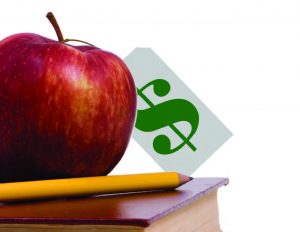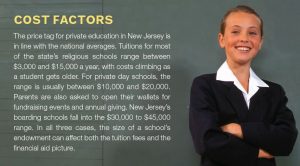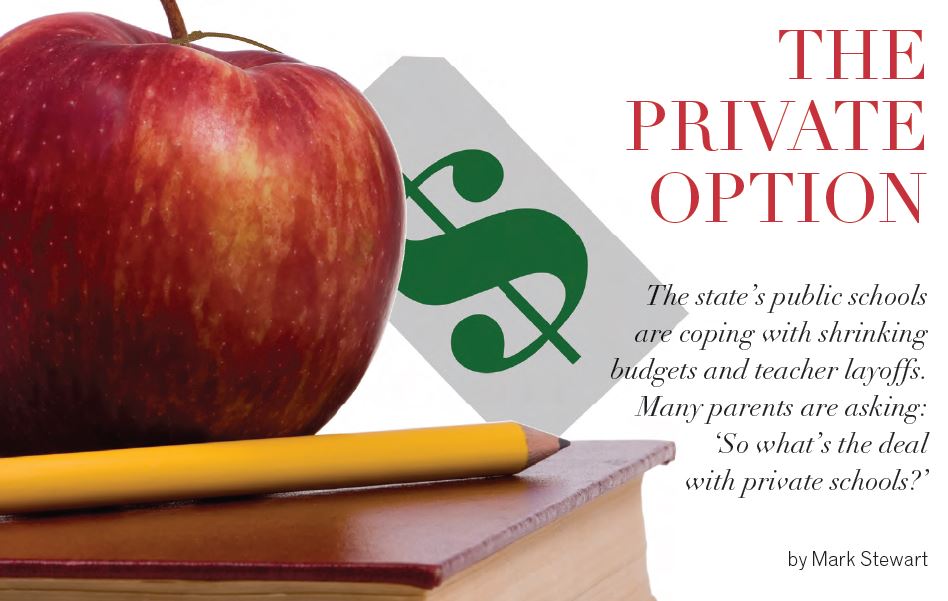The state’s public schools are coping with shrinking budgets and teacher layoffs. Many parents are asking: ‘So what’s the deal with private schools?’
Say what you will about New Jerseyans. Compared to the average American, we are pretty darn smart. The numbers don’t lie. Our children consistently score at or near the top of the national rankings for math, reading, writing, standardized tests and percentage of high-school grads headed to college. Some have observed that college students represent the state’s number-one export. As a people and as a state, in good times and bad, we spend a ton of money on K-thru-12 education. So how come we’re so clueless when it comes to choosing between public and private schools? Almost every parent agonizes over this choice at one time or another. We weigh every variable, examine each statistic, poll our friends, and attempt to reconcile this information with our family and cultural values. Then figure out what we can and cannot afford. These are not simple calculations. Ultimately, we go with our gut…and hope we’ve made the right decision. Statistically, the case for public education in New Jersey is a strong one (see sidebar). In addition, the state’s public schools hold the promise of a more realistic and representative preview of life, bringing together young people from different cultural and economic backgrounds, with a wide range of academic capabilities and learning skills. Public schools also tend to have more competitive sports programs and, in the case of New Jersey’s magnet schools, focused educational tracts for high-achieving
students—from Engineering to Communications to Marine Sciences. Intellectually, we know that private schools tend to offer a number of advantages, including spiffier amenities and traditions of high achievement. Most of these are linked to the fact that private schools do not receive tax dollars, and thus are free from the vagaries of state policy-makers and budget woes, like the one we’re in right now. Private schools are free, so to speak, to do as they please—or, more to the point, to do as parents please.

A SENSE OF COMMUNITY
What bang do private-school parents expect for their tuition buck? For many families, the decision is all about college; the sooner they “mainstream” their kids, the better the university they are likely to attend. For others, the pull of going private is the extra attention that they believe will be (and typically is) lavished upon their offspring. And, of course, for some families, a driving force behind writing that big tuition check is the belief that it will open up all kinds of new social opportunities. Elizabeth O’Mara, Director of Strategic Marketing & Communications at Far Hills Country Day School, views the social component of a private school experience through a different prism. It is an outgrowth of what she considers to be one of the key advantages of going private: an understanding of the partnership between school and home. “The school becomes the neighborhood for many of our families,” O’Mara says. “We have a community where parents are encouraged to get involved in the classroom and out. We think of our parents as partners. We value inclusion, and we ask parents and faculty to model that for our students.” Chad Small, Headmaster of Rumson Country Day School, has worked as a teacher and administrator in both sectors. He points out an inherent strength in this sense of community. “Families have chosen us and want to work with us,” explains Small. “If they don’t like us, or we don’t like them, it’s ‘See you later.’ That enables us to develop a core
sense of values we can pursue, in our case Kind, Honest, Respectful and Responsible.”
IT’S ACADEMIC
For those able to wangle the added cost of a private education, the benefits to the family as a whole are secondary to the advantages awaiting the individual student. That being said, the job of private schools is not to spin straw into gold. Rather, it is to maximize a child’s academic opportunities and challenges. To the naked eye, the greatest difference between private and
public education in New Jersey is class size. In this case, looks definitely are not deceiving. Every administrator contacted for this story ranked the smaller class sizes in their schools at or near the top of the list when asked about key points of differentiation. Obviously, this translates into more “teacher time” per student. But what does that mean exactly? In most cases, it gives schools the flexibility to recognize the different ways kids learn and achieve excellence. For schools that begin in kindergarten, it also translates into a formal plan for social and emotional learning, which is designed to create a stronger academic foundation, as well as opportunities for leadership. The goal is to turn out a child who is self-reliant, flexible and confident both in and out of school. Directly and indirectly, this is actually where a high percentage of tuition dollars go. Because its curriculum is not mandated by any legislative body, a private school can aim as high as it wants in terms of the type and quality of education it offers. It can be more rigorous, offering courses such as Latin and Language Arts to grade-schoolers. It is also free to make course alterations when new research compels it to. Unlike public schools, private schools must continuously strive to improve. If they don’t, they risk going out of business.
NARROWING THE FIELD
Among the many private education choices in New Jersey are myriad schools with some type of religious affiliation, and also single-gender schools. Both have an added element of “mystery” for prospective parents, particularly if they did not attend these types of schools themselves. In terms of size, quality and cost, faith-affiliated schools (for lack of a better catch-all term) run the gamut. Many of these institutions also happen to be single-gender, such as highly regarded Mount Saint Mary in Watchung and Oak Knoll School of the Holy Child, which is located in Summit, both of which are all-girls. Needless to say, the perceived benefit of a religious school is the attention given to a student’s spiritual development. For some families, this is a primary concern when choosing a private school. To others, it’s an afterthought. Timothy Saburn, Head of School at Oak Knoll, sees spiritual development as part of the bigger picture of community. “It’s an important aspect of a successful school today, whether independent, public or otherwise,” he maintains. “Our school culture and program foster a sense of community, which is grounded in our spiritual commitment.” Does that hold true even when a student happens to adhere
to a faith other than the one with which a school is affiliated? Donna Toryak, Admissions Director at Mount Saint Mary
Academy, insists that it does. “The values, code of ethics, discipline and spirituality are universal features that attract
the applicants,” she says. “The faith journey of each student is enriched no matter what the practice of venerating their
own God.” In terms of the gender question, Saburn cites a 2009 UCLA study. It suggests that graduates of girls’ secondary schools have a definite edge over their co-ed peers. “This current research validates, and Oak Knoll proves,” he says, “that
young women in a single-sex learning environment are setting high educational goals, breaking gender barriers, and emerging as leaders. Our young women graduate with a sense of purpose and much promise; they have found their voices and are committed to making their marks in the world.” Finally, at the top of the private-education food chain in New
Jersey are its boarding schools, including world-class institutions such as Peddie, Blair and Lawrenceville. The decision to send one’s child off to boarding school—and how to pick the right one—is an article unto itself. For the purposes of this story, suffice it to say that for families leaning toward boarding school as a high-school option, the Garden State offers some superb options for those who don’t care to schlep to Massachusetts.

STARTING EARLY, FINISHING STRONG
For many families weighing the pros and cons of going private, decision time can come prior to first grade. More than 50,000 children each year are enrolled in private-school pre-K programs in New Jersey. The number of six year olds in private schools drops to around 15,000. From there the enrollment numbers dwindle by a few hundred a year until ninth grade, when there is a jump back up over 15,000. Families sending their public middle schoolers to private day schools and boarding schools account for some of this bump. However, in any given school year, a recent study showed, as many as one in five families is moving a child from public to private, or private to public, so it’s a fluid situation to say the least. What happens after high school? For private-school educators and parents, this is where the rubber meets the road. For the overwhelming majority of kids in private secondary education, college is not just an option. It is the next thing they will do. Will the same kid get into a better college as a private-school senior or a public-school senior? The answer honestly depends on the kid as much as the type of school. However, where private schools offer a clear advantage is in the college advisory and application process. There simply is no comparison. Students enrolled at private schools in almost all cases receive much better preparation for their college years.
According to Toryak, this is a result of several factors. “They are surrounded by classmates with similar values with regard to education and their future,” she points out. “They are success- and goal-oriented, and focus on their current situation as a stepping stone to the college years ahead.” Toryak adds that, because most private high schools have established communications and relationships with colleges, their counselors are better at helping students navigate what has become an increasingly tricky acceptance process. Willard Taylor Jr., Director of Admissions at Newark Academy, believes that private schools are also equipped to determine the “best fit” for students when it comes time to narrowing down their college choices. In terms of the commonly held belief that a top school “automatically” gets kids into a top college, he insists that strong students take care of that themselves. “What an independent school will do,” Taylor says, echoing the thoughts of his peers, “is give a student the opportunity to stand out…to participate and perform at a high level academically, athletically, and in the arts.” EDGE
Editor’s Note: Mark Stewart has two teenage daughters. One opted for public education, the other for private. Both attended a private day school through eighth grade.





